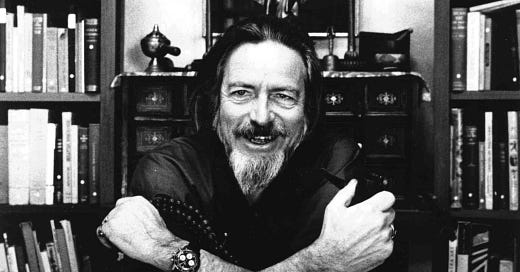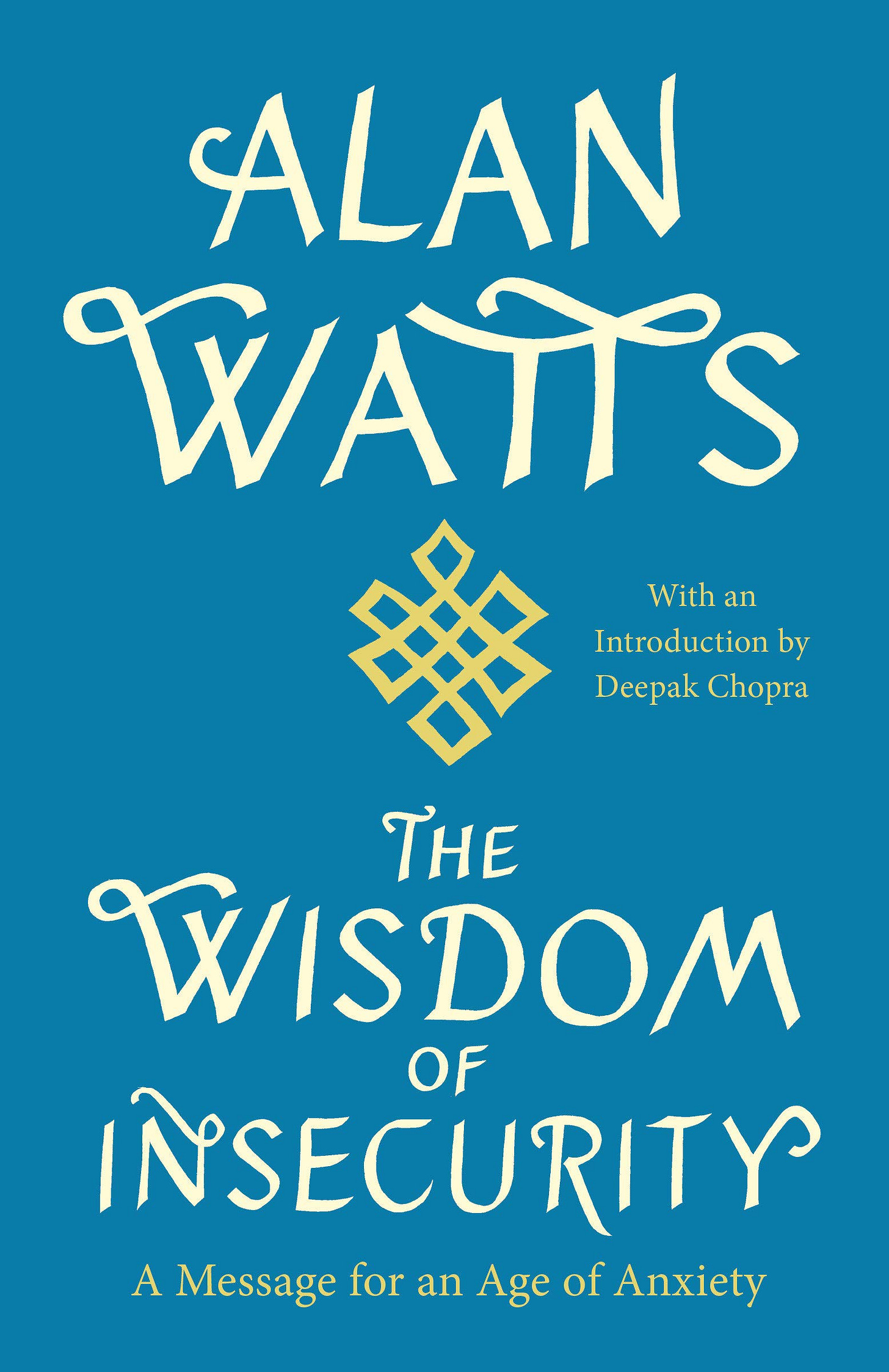To Read: The Wisdom of Insecurity by Alan Watts
A weekly book recommendation with my favorite quotes.
In 2020, I started an ongoing series via my Instagram (@conktales) where I posted a handful of quotes from whichever book I’d just finished—but only if it were one I’d recommend to others.
I would like to continue and add to that idea here on Substack; and if you have any book recommendations of your own, I beg you to please share them in the comments for all of us to benefit.
To purchase this week’s recommended book, please consider using the provided Amazon affiliate link here or at the bottom.
My rating: 9/10
In sum: Whenever I look for a new book to read, I always make sure to first reflect on the circumstances of my life at that time. I ask myself, what is the best book for me to read right now. A book can change everything if it finds you at the right time.
Continuing the previous weekly thread, I chose to read The Wisdom of Insecurity for the same reasons I also read Freedom from the Known by Jiddu Kirshnamurti.
Alan Watts has always been a treasure trove of insight for me, and I highly recommend listening to his talks, all of which are readily available on YouTube and Spotify.
If you’re looking for a good launch point, I’d recommend starting here.
“If happiness always depends on something expected in the future, we are chasing a will-o’-the-wisp that ever eludes our grasp, until the future, and ourselves, vanish into the abyss of death.” p.15
“Most of us believe in order to feel secure, in order to make our individual lives seem valuable and meaningful. Belief has thus become an attempt to hang on to life, to grasp and keep it for one’s own. But you cannot understand life and its mysteries as long as you try to grasp it. Indeed, you cannot grasp it, just as you cannot walk off with a river in a bucket. If you try to capture running water in a bucket, it is clear that you do not understand it and that you will always be disappointed, for in the bucket the water does not run. To “have” running water you must let go of it and let it run. The same is true of life and of God. The present phase of human thought and history is especially ripe for this “letting go.” Our minds have been prepared for it by this very collapse of the beliefs in which we have sought security.” p.24-25
“If, then, we are to be fully human and fully alive and aware, it seems that we must be willing to suffer for our pleasures.” p.31
“Because consciousness must involve both pleasure and pain, to strive for pleasure to the exclusion of pain is, in effect, to strive for the loss of consciousness.” p.32
“Because life is likewise a flowing process, change and death are its necessary parts. To work for their exclusion is to work against life.” p.32
“The power of memories and expectations is such that for most human beings the past and the future are not as real, but more real than the present.” p.34
“They fail to live because they are always preparing to live.” p.36
“To be passing is to live; to remain and continue is to die. ‘Unless a grain of corn fall into the ground and die, it remains alone. But if it dies, it brings forth much fruit.’” p.41
“To resist change, to try to cling to life, is therefore like holding your breath: if you persist you kill yourself.” p.42
“For when we fail to see that our life is change, we set ourselves against ourselves and become like Ouroboros, the misguided snake, who tries to eat his own tail.” p.43
“The only way to make sense out of change is to plunge into it, move with it, and join the dance.” p.43
“There is no other reality than present reality, so that, even if one were to live for endless ages, to live for the future would be to miss the point everlastingly.” p.52
“Since what we know of the future is made up of purely abstract and logical elements—inferences, guesses, deductions—it cannot be eaten, felt, smelled, seen, heard, or otherwise enjoyed. To pursue it is to pursue a constantly retreating phantom, and the faster you chase it, the faster it runs ahead. This is why all the affairs of civilization are rushed, why hardly anyone enjoys what he has, and is forever seeking more and more. Happiness, then, will consist, not of solid and substantial realities, but of such abstract and superficial things as promises, hopes, and assurances. Thus the “brainy” economy designed to produce this happiness is a fantastic vicious circle which must either manufacture more and more pleasure or collapse—providing a constant titillation of the ears, eyes, and nerve ends with incessant streams of almost inescapable noise and visual distractions. The perfect “subject” for the aims of this economy is the person who continuously itches his ears with the radio, preferably using the portable kind which can go with him at all hours and in all places. His eyes flit without rest from the television screen, to newspaper, to magazine, keeping him in a sort of orgasm-with-out-release through a series of teasing glimpses of shiny automobiles, shiny female bodies, and other sensuous surfaces, interspersed with such restorers of sensitivity—shock treatments—as “human interest” shots of criminals, mangled bodies, wrecked airplanes, prize fights, and burning buildings. The literature or discourse that goes along with this is similarly manufactured to tease without satisfaction, to replace every partial gratification with a new desire. For this stream of stimulants is designed to produce cravings for more and more of the same, though louder and faster, and these cravings drive us to do work which is of no interest save for the money it pays—to buy more lavish radios, sleeker automobiles, glossier magazines, and better television sets, all of which will somehow conspire to persuade us that happiness lies just around the corner if we will buy one more.” p.62
“There are few grounds for hoping that, in any immediate future, there will be any recovery of social sanity. It would seem that this vicious circle must become yet more intolerable, more blatantly and desperately circular before and large number of human beings awaken to the tragic trick which they are playing on themselves. But for those who see clearly that it is a circle and why it is a circle, there is no alternative but to stop circling. For as soon as you see the whole circle, the illusion that the head is separate from the tail disappears.” p.70
“The truth is revealed by removing things that stand in its light, an art not unlike sculpture, in which the artist creates, not by building, but by hacking away.” p.76
“When, on the other hand, you realize that you live in, that indeed you are this moment now, and no other, that apart from this there is no past and no future, you must relax and taste to the full, whether it be pleasure or pain. At once it becomes obvious why this universe exists, why conscious beings have been produced, why sensitive organs, why space, time, and change. The whole problem of justifying nature, of trying to make life mean something in terms of its future, disappears utterly. Obviously, it all exists for this moment. It is a dance, and when you are dancing you are not intent on getting somewhere. You go round and round, but not under the illusion that you are pursuing something, or fleeing from the jaws of hell.” p.116
“The meaning and purpose of dancing is the dance.” p.116
“You can only live in one moment at a time, and you cannot think simultaneously about listening to the waves and whether you are enjoying listening to the waves.” p.125
Have you read this book? Or any of Alan Watt’s books? Feel free to comment below for a discussion.






